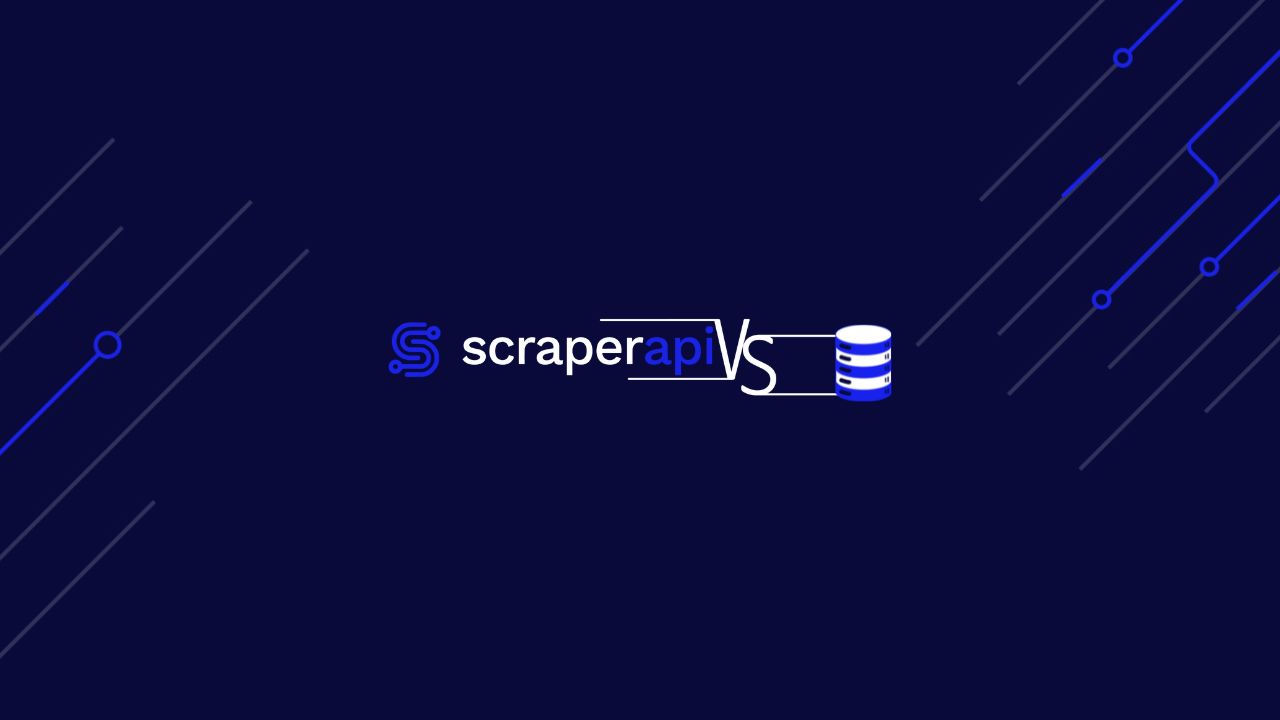Using the right proxy service is crucial for keeping your web scrapers running smoothly. Proxies help prevent IP bans, control request rates, and access content restricted by location. Choosing the wrong proxy service can result in frequent blocks, higher costs, and worse data quality, which can affect the success of your scraping projects.
In this article, we’ll compare traditional proxy services with ScraperAPI in terms of pricing, features, and flexibility.
By the end, you’ll understand why ScraperAPI is an excellent choice for developers and data teams who want to improve their web scraping efforts.
TL;DR: Scale Your Data Pipelines with ScraperAPI
Here’s a quick comparison to show how ScraperAPI stacks up against traditional proxy services:
| Feature | Traditional Proxy Service | ScraperAPI |
| Pricing | Based on the data size | Consistent, flat pricing |
| Proxy Management | Separate plans for data center, residential, mobile | Smart proxy rotation |
| Plan Flexibility | Individual plans for each proxy type | One plan for all proxies |
| Tool Access | Limited to proxies | Full suite of scraping tools included |
| Automation | Limited or no automation features | Includes async scraping and scheduling features |
| Geotargeting | Limited options | Comprehensive geotargeting |
| CAPTCHA Handling | Limited or no support | Included |
Keep reading to learn more about the unique advantages of ScraperAPI and how it can benefit your scraping projects!
ScraperAPI’s advanced bypassing techniques let you collect data from sites protected by all major bot blockers in the market.
How Do Proxy Services Traditionally Work?
Traditional proxy services usually provide various proxy types, each with distinct characteristics, costs, and use cases. Understanding these differences is key to effectively managing your web scraping needs. Here are some of the differences between the various proxy types:
- Data Center Proxies
| Cost | Generally the cheapest option. |
| Source | These proxies use IP addresses from data centers. |
| Use Cases | Ideal for high-volume, low-sensitivity tasks where anonymity is less critical. |
| Advantages | Low-cost means they are a great starting point for projects with low budgets. |
| Drawbacks | More likely to be detected and blocked by sophisticated websites due to their recognizable data center IP ranges. They offer less anonymity compared to residential or mobile proxies. |
- Residential Proxies
| Cost | More expensive than data center proxies. |
| Source | Use IP addresses assigned to real residential locations. |
| Use Cases | Suitable for tasks requiring higher anonymity, such as accessing sites with strict anti-scraping measures. |
| Advantages | Harder to detect and block because they appear as regular home users. |
| Drawbacks | Higher costs can increase expenses, especially for large-scale scraping operations. |
- Mobile Proxies
| Cost | The most expensive option. |
| Source | Utilize IP addresses assigned to mobile carriers. |
| Use Cases | Best for the highest level of anonymity and accessing highly protected websites. |
| Advantages | Extremely difficult for websites to detect and block, as they appear as legitimate mobile users. |
| Drawbacks | The high cost can significantly increase the overall budget for web scraping projects. |
Traditional proxy services often require choosing and balancing these different proxies as separate plans. This adds a layer of complexity to managing your scraping tasks:
- Cost Management: Balancing between cheaper data center proxies and more expensive residential or mobile proxies can be challenging. You might end up overpaying if you use more expensive proxies for tasks that cheaper ones could handle.
- Proxy Allocation: Determining the right mix of proxy types for different tasks requires careful planning and constant adjustment.
- Operational Complexity: Managing separate plans for data center, residential, and mobile proxies can complicate your operations, making it harder to maintain efficiency and effectiveness in your web scraping projects.
Traditional proxy services require significant effort to optimize costs and manage proxies effectively, often leading to higher expenses and operational challenges.
How ScraperAPI handles proxy management
Unlike traditional proxy services, ScraperAPI uses machine learning and statistical analysis to select the right proxies and guarantee successful requests.
Thanks to its smart proxy rotation algorithm, ScraperAPI manages proxy pools more efficiently. It only chooses more expensive proxies when they are absolutely needed, passing the cost savings on to you and automating the entire process to ensure high success rates.
Instead of subscribing to several plans, you only pay for one to leverage ScraperAPI’s infrastructure. This reduces development costs and time and ensures the best possible outcome from the get-go.
What Makes ScraperAPI Proxy Infrastructure Unique?
ScraperAPI offers a unique proxy infrastructure that differentiates it from traditional proxy services. Here’s how ScraperAPI stands out and provides superior solutions for your web scraping needs:
1. Smart Proxy Rotation
ScraperAPI smart proxy rotation is an automated system that handles the entire proxy rotation and management process.
When you use traditional proxy services, you’re in charge of creating the entire infrastructure to ensure you’re using the right proxies at the right time. This complicates your projects, increasing development costs and widening the margin of error.
| Functionality | ScraperAPI uses advanced machine learning and statistical analysis to select the best proxy for each request automatically. |
| Advantages | It starts with data center proxies and only switches to residential or mobile proxies when necessary, ensuring the lowest possible cost for successful requests. |
| Benefits | This intelligent rotation system maximizes efficiency, reduces costs, and increases the success rate of your scraping projects. |
However, it goes beyond just proxies, as these are only one piece of the puzzle. ScraperAPI also generates and matches headers and cookies for your requests, ensuring higher anonymity for your scrapers.
2. One Plan for All Proxies
Instead of subscribing to several proxy plans, ScraperAPI offers a unique solution that integrates all proxy types into a single subscription. This makes decision-making and budgeting easier. No big surprises or hidden costs.
All of these while providing full control over your project.
| Simplified Pricing | Unlike traditional services that require separate plans for different proxy types, ScraperAPI offers a single subscription plan. |
| Flexibility | This plan gives you access to all proxies, including data center, residential, and mobile proxies. |
| Customization | You can enable "premium" or "ultra-premium" proxies for more challenging scraping tasks, ensuring a higher success rate for challenging domains. |
3. Comprehensive Tool Access
ScraperAPI offers a suite of web scraping tools and APIs that make web scraping easier and faster. These include:
- Structured data endpoints (SDEs) that turn HTML pages from popular domains into ready-to-use JSON or CSV data.
- An async scraper to handle millions of requests asynchronously for large projects, further automating retries and concurrencies.
- A hosted scraper, DataPipeline, that allows you to schedule recurrent scraping jobs with a visual interface or programmatically via APIs.
All of these tools are built on top of our scraping API, which has the infrastructure necessary to bypass advanced anti-scraping mechanisms from even the toughest sites, giving each and every one of our tools features like:
| Geotargeting | Scrape localized data with proxies located in more than 50 countries around the world. |
| CAPTCHA Handling | Handle complex CAPTCHAs to ensure a successful response. |
| Rendering | Render JS-heavy websites before returning the resulting HTML data. |
| Rendering Instructions | Perform site interactions before returning the rendered HTML data. |
| Smart Proxy Rotation | Ensure high success rates at scale for even the most protected sites, bypassing anti-bots like DataDome, PerimeterX, and CF Turnstile. |
The best part is that all these tools are included in the same price structure, avoiding the need for multiple subscriptions or additional costs.
4. Enhanced Automation
ScraperAPI was built to simplify large-scale web scraping, giving support to advanced, automated techniques:
| Asynchronous Scraping | ScraperAPI supports large-scale projects with async scraping, which handles retries and concurrency automatically for millions of requests. |
| Scheduling Features | ScraperAPI’s DataPipeline’s scheduling features allow you to automate scraping projects through a user-friendly dashboard or API endpoints. Up to 10,000 URLs per project and unlimited projects. |
| Increased Success Rates | These automation features improve efficiency and reliability, ensuring higher success rates for your scraping tasks |
By combining smart proxy rotation, simplified pricing, comprehensive tool access, and enhanced automation, ScraperAPI provides a more advanced, cost-effective, and scalable solution for web scraping. This unique infrastructure makes ScraperAPI a superior choice for developers and data teams aiming to optimize their web scraping efforts and achieve better results.
Why Choose ScraperAPI for Data Collection
Now that you understand the differences between traditional proxy services and ScraperAPI let’s discuss when you should choose ScraperAPI over other options.
The main advantage of ScraperAPI is that it provides more features at a lower cost while also being built to grow and adjust to your data requirements and scraping needs.
Here are some factors to consider:
Price Structure
- Affordable Pricing: ScraperAPI is usually cheaper than traditional proxy services. It offers different plans that fit both small and large businesses.
- No Hidden Fees: The costs are clear and straightforward, making budgeting easier.
Ease of Use
- Simple Interface: ScraperAPI is easy to use, even if you’re not very technical. The interface is straightforward and user-friendly.
- Helpful Guides: Plenty of guides and resources help you get started and make the most of the service.
Scalability
- Grows with Your Needs: ScraperAPI can handle more requests as your business grows. It can scale up without issues, whether you need to scrape a few hundred pages or millions.
- Consistent Performance: The reliable service ensures your scraping tasks are completed quickly and efficiently.
Adaptability
- Customizable: ScraperAPI can be adjusted to fit your specific needs. Whether you need to extract certain data types or bypass complex anti-scraping measures, it has the necessary flexibility.
- Advanced Features: With features like automatic IP rotation, CAPTCHA handling, and geo-targeting, ScraperAPI can handle more complex scraping tasks than traditional proxy services.
ScraperAPI is an excellent choice because it is affordable, easy to use, scalable, and adaptable. By choosing ScraperAPI, you can efficiently handle all your web scraping needs with a single solution.
Wrapping Up
Choosing the right proxy service can significantly impact the efficiency and success of your web scraping projects. Traditional proxy services might be suitable for straightforward, low-volume tasks, but they often come with complexities and higher costs as your needs grow.
ScraperAPI offers a more advanced solution with consistent pricing, ease of use, scalability, and a comprehensive toolset. By leveraging ScraperAPI’s smart proxy rotation, unified plan, and extensive features, you can optimize your web scraping efforts, reduce costs, and improve your overall success rates.
Still in doubt? Let us help you make up your mind with these resources:

